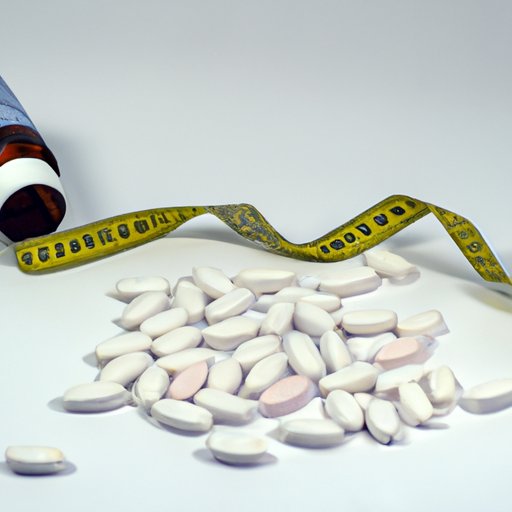
Introduction
Nortriptyline is a medication that is commonly used to treat depression, anxiety, and other mental health conditions. However, many people who take this medication may be concerned about the risk of weight gain. In this article, we will explore the link between nortriptyline and weight gain, discuss the potential side effects of the medication, provide management strategies, and share real experiences from individuals who have taken nortriptyline.
The Link Between Nortriptyline and Weight Gain: What You Need to Know
Nortriptyline is a tricyclic antidepressant that works by affecting the levels of certain chemicals in the brain called neurotransmitters. This medication can lead to weight gain due to its effects on the body. Specifically, it can increase appetite, slow down metabolism, and cause fluid retention.
There are several risk factors that may increase the likelihood of weight gain while taking nortriptyline. These include age, genetics, a history of weight gain or obesity, and an inactive lifestyle.
Nortriptyline Side Effects: Is Weight Gain One of Them?
Like all medications, nortriptyline comes with certain side effects. These may include dizziness, drowsiness, dry mouth, constipation, and blurred vision. Weight gain is also a potential side effect of nortriptyline use, although it does not occur in all cases.
Studies have found that weight gain is relatively common in those taking nortriptyline. However, the amount of weight gained can vary widely between individuals. Some people may experience only a small amount of weight gain, while others may gain a significant amount of weight.
Managing Weight While Taking Nortriptyline: Tips and Strategies
If you are concerned about weight gain while taking nortriptyline, there are several strategies that you can use to manage your weight.
One of the most important strategies is to maintain a healthy diet. This may include eating a balanced diet with plenty of fruits, vegetables, whole grains, and lean protein. You may also want to limit your intake of processed foods, sugary beverages, and other high-calorie foods.
Regular exercise is also important for managing weight while taking nortriptyline. Even small amounts of exercise, such as a daily walk or gentle stretching, can have a positive impact on weight management.
In some cases, alternative treatment options can be used that may not cause weight gain. These may include other types of antidepressants or other medications such as cognitive-behavioral therapy or electroconvulsive therapy.
Exploring the Science Behind Nortriptyline and Weight Gain
The scientific mechanisms by which nortriptyline can cause weight gain are complex and not fully understood. However, studies have suggested that the medication can increase appetite by affecting the levels of certain hormones in the body, such as leptin and ghrelin.
Other studies have found that nortriptyline may slow down metabolism and cause fluid retention. These effects may contribute to weight gain in some individuals.
More research is needed to fully understand the link between nortriptyline and weight gain and to develop effective management strategies.
Real People, Real Experiences: Nortriptyline and Weight Gain
For many people, the experience of taking nortriptyline and managing weight gain is a personal one. Here are a few stories from individuals who have taken nortriptyline and their experiences with weight gain:
– “I gained about 15 pounds when I started taking nortriptyline. It was really frustrating, but I talked to my doctor about it and we came up with a plan to manage my weight. I started eating a healthier diet and exercising more regularly, and over time, I was able to lose some of the weight.”
– “I didn’t gain any weight when I took nortriptyline, but I did notice that I felt more hungry than usual. I had to be really mindful of my eating habits and make sure that I was making healthy choices.”
Talking to Your Doctor About Nortriptyline and Its Impact on Weight Management
If you are concerned about weight gain while taking nortriptyline, it is important to talk to your doctor about your options. Here are some questions you may want to ask:
– What are the risks and benefits of taking nortriptyline for my condition?
– What are the potential side effects of nortriptyline, including weight gain?
– What strategies can I use to manage my weight while taking nortriptyline?
– Are there alternative treatment options that may not cause weight gain?
Remember, open communication with your doctor is key to effectively managing your mental health condition and any associated side effects.
Conclusion
When taking nortriptyline, weight gain is a potential side effect that many people may experience. However, there are several strategies that can be used to manage weight, including maintaining a healthy diet and getting regular exercise. By working with your doctor and staying proactive about your health, you can effectively manage weight gain and prioritize your well-being.





